|
If the title of this post sounds a bit familiar, then you probably recall this quote was some of the first words uttered by Pope Emeritus Benedict XVI when he appeared at the central balcony over St. Peter’s Square upon his election in 2005. Not too long ago, we saw that humility in even greater depth when Benedict resigned from his role as Bishop of Rome, recognizing that his “strength… has deteriorated in me to the extent that I have had to recognize my incapacity to adequately fulfill the ministry entrusted to me.” Knowing that he could no longer serve as the Vicar of Christ in the manner which he desired, and trusting in God’s will, he freely renounced his office in order for another to steer the Catholic Church.
While this act of Pope Benedict truly stands out as an act of a holy man, this is far from the only example of faith from a Roman Pontiff. As the Church celebrates the Solemnity of All Saints, it provides a moment to reflect on a few other Popes, especially in the twilight of a year which saw two Popes canonized and another beatified by Pope Francis. When Cardinal Giuseppe Roncalli entered the conclave of 1958, it is famously asserted that he had already booked his train ticket back to Venice – for he never expected to be elected by the College of Cardinals. Yet, when elected he chose the name John, partly because of John the Evangelist, the beloved of the Lord. Just the great apostle had done, St. John XXIII, too, laid himself at the service of Christ. When he first began talking about convening the Second Vatican Council, many of his contemporaries doubted it would ever occur. Nevertheless, knowing he was trying to fulfill God’s will, the pope persisted and opened the council on October 11, 1962. This was just one instance out of so many that showed what kind of person “Good Pope John” strove to be. He acted not for ovations for himself, but rather for the glory of God. In December 1963, President Lyndon Johnson awarded the Presidential Medal of Freedom posthumously to John XXIII. The President remarked, “He was a man of simple origins, of simple faith, of simple charity. In his exalted office he was still the gentle pastor…His goodness reached across temporal boundaries to warm the hearts of men of all nations and of all faiths.” One of John XXIII’s closest friends was Cardinal Giovanni Montini. Upon his election a Pope Paul VI, he continued the work of his predecessor in overseeing Vatican II. If humility and surrendering to God’s plan are signs of sanctity, then two moments stand out in the pontificate of the man now called “Blessed.” In 1963, at a Mass in St. Peter’s Basilica, Blessed Paul VI removed his tiara and placed it on the alter – a symbolic act showing that the pope not only gave up claims to temporal power on earth, but also yielded fully to the will of the Lord in heaven. Another touching example is his steadfastness after issuing his most famous encyclical, Humanae Vitae. In it, the pope reiterates the Church’s teaching on marriage and denunciation of artificial birth control. Though his words were well received in some parts of the world, the reaction was quite negative. Yet, Blessed Paul VI knew that he was reaffirming ultimate truths and that no matter the criticism, his faith would see him through. Modern history’s second longest papacy came soon after Paul VI. St. John Paul II, JPII, John Paul the Great – no matter what the title, the sentiment is the same. The faithful witnessed a saint walking among them. His magnificent sanctity was seen exquisitely in December of 1983. Two days after Christmas, the pope travelled to Rebibbia prison to meeting with Mehmet Ali Agca, the man who tried to assassinate the pontiff just two years before. During the meeting, John Paul again forgave his would-be-assassin. Years later, the Italian government pardoned Agca at the pope’s urging. This episode, too, was an example of the great faith of the Bishop of Rome. Not only did he imitate Christ’s actions two-thousand years ago, but he also gave a great model for the present day faithful. If a man could humble himself to forgive another man for trying to kill him, all the more people should forgive each other for the smaller transgressions in life. Many people consider themselves lucky to attend a papal event, watch the pope pass by them in an open vehicle, or even to just hear the pope at a Sunday Angelus. Indeed, so many others never get the opportunity to come in close contact with the Vicar of Christ. Nevertheless, a priest once said that these holy men are now even closer to the faithful than ever before because they number among the saints in heaven. The Catechism reminds us, “the union of the wayfarers with the brethren who sleep in the peace of Christ is in no way interrupted, but on the contrary, according to the constant faith of the Church…those who dwell in heaven fix the whole Church more firmly in holiness…They do not cease to intercede with the Father for us” (CCC 955-6). By asking for their intercession and following their example, the faithful are led home to the Father in heaven and can number among the Communion of Saints. For more information, check out the Catholic Apostolate Center's Paul VI and our Sts. John Paul II and John XXIII Resource Pages! Victor David is a staff member at The Catholic University of America in Washington D.C.
0 Comments
“The fire of the Holy Spirit was sent down upon the Apostles at Pentecost in answer to their fervent prayer; ardent prayer in the Spirit must always be the soul of new evangelization and the heart of our lives as Christians.”
– Pope Francis (General Audience, May 22, 2013) Prayer. Sometimes we make it so difficult. I am not sure why. Maybe we think it needs to be very formal or formulaic? I know that I thought that for a very long time. There is certainly a place for formal prayer, be it communal, such as during the Mass or the Liturgy of the Hours or even private, such when use a formal written prayer. In fact, we Catholics have a love affair with our prayer cards, books, and other sacramentals, including candles, statutes, and icons. This is an excellent thing because “they prepare us to receive grace and dispose us to cooperate with it” (Catechism of the Catholic Church, n. 1670). They are, though, simply means, not ends in themselves. Means to a conversation with God or maybe more precisely, a dialogue. We might not consider it a dialogue. Fervent prayer, ardent prayer, in the way that Pope Francis is calling for is an on-going dialogue with God throughout our day, an awareness of the action and activity of the Holy Spirit permeating our lives. It is a seeking for God and finding God in all things, in every moment and in every place. St. Teresa of Avila encourages us to be seekers of God and St. Ignatius of Loyola calls us to “find God in all things.” St. Vincent Pallotti puts the two aspects together, as was often his way, and challenges us to: “Seek God and you will find God. Seek God in all things and you will find God in all things. Seek God always and you will always find God.” We certainly need to take time to be in communal prayer like those in the Cenacle or Upper Room at Pentecost. We also need to be in private prayer, setting aside time to go to our “inner room, close the door, and pray to [our] Father in secret” (Matthew 6:6). The Holy Spirit, though, is active and alive everywhere, if we but open our eyes to see and our ears to hear. Fr. Frank Donio, S.A.C., is the Director of the Catholic Apostolate Center This blog post was first published on October 26th on the St. Joseph’s College of Maine Theology Faculty Blog. Click here to learn more about our cooperative alliance with St. Joseph’s College Online Every day, I get to experience the joy of teaching Kindergarten, a time when the minds of young children are at a crucial point developmentally. Part of my job as their teacher is to form them into becoming a “person for others,” a term we use often in our classroom. There are days when showing them and teaching them about Christ’s mission of love and mercy turns into a lofty concept that is difficult for them to grasp. Toys fly across the room and children chase each other with plastic carrots, and teaching them to be a “person for others” seems difficult. Being a person for others is someone who does the work of Jesus Christ: loving others unconditionally and helping those who need help. Being with these children every day made me think more closely about unconditionally loving everyone we come into contact with.
An example of this love and sacrifice is Our Holy Father, Pope Francis. This Pope has taught the world to take chances, get messy, and make mistakes for Christ. His merciful methods, when speaking about teachings of the Church, show Catholics and the world that he believes each person can truly be an evangelizer to all people. He has reminded us that while it is one thing to write a check to a food drive, it is another thing entirely to truly be with the poor and suffering. He has shown us that we are all brothers and sisters in this journey of faith, and we are on the road together. We all need to be a “person for others.” There is so much to distract us from the people around us. We often turn a blind eye to all kinds of problems. We rarely stop to think about how our actions can affect others. As a way to be more reflective, I like to pray the Examen. The Examen is a short prayer by St. Ignatius of Loyola, which is usually reflected upon in a quiet space: First, find a moment of gratitude from the day. Next, ask for freedom of something that has been weighting you down. Then, review the day in all of its parts both good and bad. Finally, talk to God about anything on your mind or heart. Finish the Examen with a short prayer, and you are ready to begin a new day filled with grace. When we take the time to reflect on our lives and ourselves, we can become aware of the kind of person we want to be. Jesus came to the world with a selfless mission to encourage and share His love and compassion. When we are merciful, loving, and caring with other members of the Church, face-to-face and shoulder-to-shoulder, we can evangelize and change the world. It begins with you; be a person for others! Krissy Kirby is a kindergarten teacher in the Archdiocese of Washington On October 8, 2013, Pope Francis announced that in October 2014 there would be an Extraordinary General Assembly of the Synod of Bishops on topics related to the family and evangelization. A year later, more than 250 participants, including 14 married couples from around the world, gathered in Rome to find ways to improve the pastoral application of church teachings, ways to explain it, and to help Catholics live it. The goal of this synod was not to reach definitive conclusions but rather set the agenda for a larger world synod in October 2015. Until then, the 185 bishops in attendance would share what was discussed in the Synod with their respective dioceses in preparation for implementation before sharing their experiences with and making recommendations to the Holy Father.
It is on such an occasion that we reflect on the office of the bishop, men who are “endowed with the authority of Christ” by virtue of apostolic succession to “exercise their pastoral office over the portion of the People of God assigned to them” (CCC 888, 886, cf. 2 Timothy 2:2). These men are much more than diocesan administrators of the Church— by virtue of their identities as the successors of the Apostles, they wield the same power and authority to govern the universal Church as that given to their predecessors by Christ. Together, with the Bishop of Rome (the successor of Peter), and assisted by priests and deacons, the college or body of bishops tend to their local Churches; by ruling them well, each bishop contributes “to the welfare of the whole Mystical Body, which, from another point of view, is a corporate body of Churches” (CCC 884-886). The role of the bishop is threefold: to teach, to govern, and to sanctify. With priests as co-workers, the bishop’s first task is “‘to preach the Gospel of God to all men,’ in keeping with the Lord’s command” (CCC 888). In order to preserve the purity of the Faith first entrusted to the Apostles, Christ extends a share in His own infallibility to the bishops of the Church who are working in communion with the Pope (CCC 890). This Magisterium, then, is tasked with overseeing the spread of the Gospel and addressing any misunderstandings regarding the Church’s dogma; in matters of faith and morals, the extraordinary Magisterium is infallible, particularly when assembled in an Ecumenical Council or proposing a doctrine “for belief as being divinely revealed” (CCC 891). Secondly, each bishop governs his local Church (i.e. diocese) by his counsels, exhortations, and example. Though he has authority and sacred power, the bishop exercises them— in communion with the whole Church and under the guidance of the Pope— in a spirit of service to those entrusted to his care as well as the rest of Holy Mother Church (CCC 895). Finally, the bishop, “the steward of grace of the supreme priesthood,” along with the priests, sanctifies the Church through his “prayer and work, by [his] ministry of the word and of the sacraments” (CCC 893). By his example, the bishop helps his entrusted flock attain eternal life. Just as our Lord is the often portrayed as the model shepherd, the bishop, like the “Good Shepherd,” must lead his faithful flock along the path of salvation, disciplining and protecting them as needed. To set them apart from other religious, bishops utilize special regalia distinctive to their Office, that is, the fullness of the Sacrament of Holy Orders: the pectoral cross, ring, the zucchetto and miter (hat), crozier (staff), and pallium. The cross, traditionally containing a relic, is attached to a chain and is worn on the chest. The ring symbolizes the bishop’s authority and traditionally is reverenced by kissing. The miter, unlike the zucchetto, is worn purely for liturgical functions and is referenced in Scripture as a headdress for the Judaic (high) priesthood (see Exodus 39:27-31; cf. Leviticus 8:7-9). The crozier clearly references the model Good Shepherd and symbolizes guidance, correction, and support. Finally, the pallium, normally reserved for metropolitan archbishops and the Holy Father, represents fidelity to Christ. These different regalia give a certain distinction to and inspire respect for the Office of Bishop and its authority. Let us never forget about our bishops! As leaders of the Church, these men are always in need of our prayers! As Blessed Pope Paul VI said when setting up the first Synod of Bishops in 1965, bishops assist in providing for the good of the universal Church through “the consolation of their presence, the help of their wisdom and experience, the support of their counsel, and the voice of their authority.” May we always follow these men who continuously defend and guide the Church in the spirit of the Apostles. Thomas Wong is an undergraduate at The Catholic University of America in Washington, D.C. “This is why the Church keeps her missionary spirit alive, and even wishes to intensify it in the moment of history in which we are living. She feels responsible before entire peoples. She has no rest so long as she has not done her best to proclaim the Good News of Jesus the Savior. She is always preparing new generations of apostles” – Pope Paul VI, Evangelii Nuntiandi, 53.
These timely words were written 39 years ago by Pope Paul VI. He will be beatified by Pope Francis this coming Sunday at the close of the Extraordinary Synod of Bishops on the Family. The contemporary discussion of the Church on evangelization was started because of Paul VI calling a Synod of Bishops on that topic in 1974. His great work on evangelization, Evangelii Nuntiandi (Evangelization in the Modern World), offers a comprehensive and still timely view of how the baptized are called to live as evangelizers. St. John Paul II, Benedict XVI, and now Pope Francis, each in his own way, have continued to call the baptized to greater attention to the evangelizing mission that Jesus Christ left us to do until he comes again in glory. Today is the third anniversary of the founding of the Catholic Apostolate Center by the Immaculate Conception Province of the Society of the Catholic Apostolate (Pallottines). The Center works collaboratively with the Church’s leaders to assist active Catholics in becoming apostles. The mission of the Center is inspired by the spirituality of St. Vincent Pallotti, who calls us all to revive faith, rekindle charity, and live as apostles. Apostles are committed evangelizers who have experienced Jesus Christ in their lives, in and through his Church, and are impelled to move out on mission into the world. On mission to do what? Proclaim the love of Christ in word and deed! As Pope Francis teaches, “Every Christian is challenged, here and now, to be actively engaged in evangelization; indeed, anyone who has truly experienced God’s saving love does not need much time or lengthy training to go out and proclaim that love” (Evangelii Gaudium, 120). There is always more that all of us can do to proclaim the love of Christ as fully and effectively as we can. If there are ways in which we as a Center can assist you in living well your mission as an apostle, then please write me at: [email protected]. Please pray for our ministry and we will continue to keep you in our prayers. May the Charity of Christ urge us on! Fr. Frank Donio, S.A.C. is Director of the Catholic Apostolate Center. 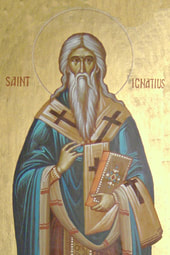 Tomorrow we celebrate the feast day of Saint Ignatius of Antioch. Although we do not know much about his early life, the last several months of his time on earth echo throughout history. Ignatius was appointed bishop of Antioch around the year 69 AD. During his time as bishop, the emperor Trajan called him an “evil spirit who leads his people to destruction.” Ignatius, also known as Theophorus (which translates to mean “God Bearer”), answered the accusation with this: “There is but one God, who created Heaven and Earth, and all that is in them, and one Jesus, made Christ, into whose kingdom I earnestly desire to be admitted.” His defiance angered Trajan and prompted him to question whether the Jesus he spoke of was the same one crucified by Pontius Pilot. Once again in defiance, Ignatius responded, “Yes, the same, who by his death has crucified both sin and it's author, and who has proclaimed that every make of the devil shall be trodden under foot by those who bear him in their hearts.” In these statements we can see that Ignatius truly epitomizes the name Theophorus. Because of these strong statements, Ignatius was sentenced to death by wild beasts in the Roman Colosseum. He was transported by ship from the seaport of Selucia, but did not travel directly to Rome—which proved to be a great mistake for those trying to rid the world of Christianity. All along his journey through Asia Minor, Christians would receive letters from Ignatius that strengthened their faith and united them. He was afforded traveling partners along the way. One of these friends, Philo, who was deacon of Tarsus and Agothopus, reportedly authored the tale of his martyrdom. Many friends and followers of Ignatius traveled to Rome ahead of the ship to await Ignatius' arrival. This infamous journey produced six letters to churches to the Christian communities throughout Asia Minor. He also wrote a letter to Bishop Polycarp of Smyrna, a fellow companion. These letters not only contain some profound and famous quotes by Ignatius, but are very important and relevant to Apostolic teachings, traditions and early Church beliefs passed on from Jesus to the Apostles, bringing true meaning to Apostolic succession. These letters undoubtedly spurred the growth and strength of Christianity for centuries to come and have proved to be the basis for the development of Christian theology. Ignatius is also known for a “first” in Christian literature, when in the letter to Smyrna, the Catholic church is spoken of. The word he uses is “Katholikos,” a Greek word meaning “universal.” Ignatius said: “Wherever the Bishop appears, there, let the people be, as wherever Jesus Christ is, there is the Catholic Church.” An important fact here is that he didn't need to explain the Greek word. It is suggested by many scholars and theologians that this wasn't the first time the word had been used. Ignatius relentlessly taught the beliefs and practices of the early Church. He stressed the value of the Eucharist, calling it “the medicine of immorality.” He taught loyalty and obedience to the bishops as the “transmitters” of the true Apostolic tradition along with the need for unity and peace. This is still very relevant to the Church today. Prior to his arrival in Rome, Ignatius pleaded to his friends and supporters that they not interfere with his eventual death and martyrdom. He said, “I am God's wheat and shall be ground by teeth of wild animals. I am writing to all the churches to let it be known that I will gladly die for God, if only you do not stand in my way. I plead with you: show me no untimely kindness. Let me be food for the wild beasts for they are my way to God.” He also said, “I prefer death in Christ to power over the farthest limits of the earth. He who died in place of us is the one object of my quest. He who rose for our sake is my one desire.” Leading his flock through faith and love for Jesus Christ, he became a living tradition and disciple of the early Church. Was it the end for St. Ignatius on that bloodied dirt floor of the Roman Colosseum that day? I think not. For as the Bishop of Antioch, he catapulted the growth of the Church and the “one true faith.” He achieved his life’s goal: to be in the presence of Jesus Christ for all eternity. Tomorrow we celebrate the feastday of St. Ignatius of Antioch, early Church Father, proclaimer and defender of the faith, and true disciple of Christ. We can all take inspiration from his true devotion to the Church and her mission. A celebration of a Saint, indeed! Mark A. Straub, Sr. is a member of the Knights of Columbus and president of the parish council of Our Lady of the Woods Parish in Woodhaven, Michigan.
Recently, I joined a Catholic group for young adults in my parish. Once a month we have a group dinner and host a guest speaker to talk informally about certain topics in our Catholic faith. One of the speakers discussed the importance of community prayer, a topic that stuck with me so much so that I wanted to share the message.
First, prayer is essential for our spiritual growth and personal well-being. God does not intend for us to bear our crosses alone. In Matthew 11:28-30 Jesus said, “Come to me, all you who labor and are burdened, and I will give you rest. Take my yoke upon you and learn from me, for I am meek and humble of heart; and you will find rest for yourselves. For my yoke is easy, and my burden light.” Being a part of a faith community serves as a support system for us. We rarely like to be alone. Don’t we all crave sharing meals with friends and family? In fact, Jesus shares the source and summit of our faith with us over a community meal. Community strengthens and unites us in our faith. Our community even prays for our intentions at Mass. Therefore, community prayer is another way for us to become closer to God through others. The communion of saints and angels are also a part of our community. Saints and angels can pray on our behalf, with us and for us. The Catechism of the Catholic Church states, “[the saints’]intercession is their most exalted service to God’s plan. We can and should ask them to intercede for us and for the whole world.” We are never alone in our prayers. Instead of trying to figure out how to pray for the intercession from every saint, our speaker suggested picking a few we feel really close to and sense a calling toward to ask for prayers on our behalf. Family prayer is the first place of our prayer education, also mentioned in the Catechism. Prayers over meals, memorizing prayers of the rosary, praying for a good grade on a test, and the list goes on. Our introduction to faith and prayer begins in the community of our home. This is why it is so important to make family prayer a priority. St. Augustine says, “For he who sings praise, does not only praise, but also praises joyfully; he who sings praise, not only sings, but also loves Him who he is singing about/to/for. There is a praise-filled public proclamation in the praise of someone who is confessing/acknowledging (God), in the song of the lover (there is) love.” The Mass, the Liturgy, is the ultimate community prayer. This is one reason why attending Mass is vital to our faith. Liturgical prayer is a public prayer following prescribed ritual intended to unite individuals with God through Christ. We are renewed each week in community prayer by attending and participating in the Mass. As always, it is necessary to have individual structured prayer time every day. This is something I struggle with and have to continually be reminded of myself. To remember the time to share with God, setting a routine of prayer and remaining disciplined in that routine can help. One of the sisters who taught at the Catholic high school I attended said for us to hide our shoes under our beds so in the morning we kneel to get them and remember to pray! Take some time today to remember to pray, and to look at the different prayer communities in your life! Dana Edwards is a recent graduate of the University of Florida. She currently resides in Tallahassee, Florida where she volunteers as a lector and with communication outreach at her local parish, Good Shepherd Catholic Church. “Jesus said to his disciples: ‘Suppose one of you has a friend to whom he goes at midnight and says ‘Friend, lend me three loaves of bread, for a friend of mine has arrived at my house from a journey and I have nothing to offer him,’ and he says in reply from within, ‘Do not bother me; the door has already been locked and my children and I are already in bed. I cannot get up to get you anything.’ I tell you, if he does not get up to give him the loaves because of their friendship, he will get up to give him whatever he needs because of his persistence. And I tell you, ask and you will receive; seek and you will find; knock and the door will be opened to you. For everyone who asks, receives; and the one who seeks, finds; and to the one who knocks, the door will be opened. What father among you would hand his son a snake when he asks for a fish? Or hand him a scorpion when he asks for an egg? If you then, who are wicked, know how to give good gifts to your children, how much more will the Father in heaven give the Holy Spirit to those who ask him?”
The friend in Jesus’ parable is persistent in asking for bread. He did not immediately give up when it seemed that the answer was no. He kept asking until his friend gave him what he needed. Just as the friend did not give up, we should be persistent as well. Instead of simply saying a Hail Mary or an Our Father and then calling it a day, it is important to persevere in prayer. For the intentions that are closest to your heart, remember to pray without ceasing. It has been said that Saint Monica prayed for the conversion of Saint Augustine for thirty years. She refused to give up when all signs seemed to indicate that her prayer went unheard! In reality, God heard her prayer and helped her son to become a great saint in heaven. Just as a little child feels safe running to his father when he needs something, Jesus invites us to treat God the Father the same way. All fathers who love their children want what is best for them. God, our heavenly Father, is no different, except his love for his children is infinitely more perfect. He wants you to spend eternity with him in Heaven. He wants to give you the graces that you need to get there, if only you ask for them. Jesus has made us a magnificent promise! “Ask and you will receive.” Although your prayers may not be answered exactly as you expect, God does promise his children something even better: the Holy Spirit! The gifts of the Holy Spirit are yours for the taking. All you have to do is ask and be persistent asking. Jennifer Beckmann is an Administrative Secretary for the United States Conference of Catholic Bishops Secretariat for Evangelization and Catechesis. Today, on the Memorial of Our Lady of the Rosary, we are reminded of the important role that the rosary plays in our daily lives. It is a form of prayer that we seek when we are struggling and need the comforting embrace of a mother. It is a form of prayer that is joyful, celebrating our successes with Christ through Mary. Devotions to Mary have always been an important aspect of my faith. In particular, the rosary has helped me through many tough times in my life and given me the strength to continue forming my life to Christ, but its importance was reinforced in the first few months of my college career when I joined the Knights of Columbus. Upon entering the Order, Knights are given a rosary as a symbol of our devotion to Mary and a reality of our reliance on her example and her intercession with God
But why should we say the rosary? Saint John Paul II gives a clear picture of the rosary’s importance: “The Rosary mystically transports us to Mary's side as she is busy watching over the human growth of Christ in the home of Nazareth. This enables her to train us and to mold us with the same care, until Christ is “fully formed” in us.” When we pray the rosary, many of us are seeking the warm embrace of a mother, someone who can reassure us in our fears and give us the strength to live out each day for Christ. Mary is our mother in every sense of that word. Christ, moments from death, says to Mary, “Behold, your son,” and to the disciple whom he loved, “Behold, your mother.” With these words Christ gives Mary to all of us as our mother, the Mother of the Church, and with these words we are formed by her just as Christ was. The rosary does not pull our attention away from Christ, but rather joins us with him through our love of Mary. John Paul II tells us in Rosarium Virginis Mariae, “Never as in the Rosary do the life of Jesus and that of Mary appear so deeply joined. Mary lives only in Christ and for Christ!” The rosary allows us to participate in that union and calls us to share in the life of Christ through our relationship with his Mother. Each time we pray the rosary we focus on the Joyful, Sorrowful, Glorious, or Luminous mysteries. These are not only drawing us closer to Mary, but to the life of Christ as each set of mysteries is grounded in the Gospel. When we pray the rosary we do not just repeat prayers over and over again, but rather we are given the opportunity to live out a different aspect of the life of Christ with each decade. Repetition is an important aspect of the rosary, but is it actually repetition? Archbishop Fulton Sheen in his book “The World’s First Love” tells us that it is not repetition for each time we say the rosary, “we are saying to God, the Trinity, to the Incarnate Saviour, to the Blessed Mother: "I love you, I love you, I love you." Each time it means something different, because, at each decade, our mind is moving to a new demonstration of the Saviour's love.” Who better to remind us of the Christ’s love than Mary, the Mother of God, our mother, who raised Jesus, formed him, and followed him. Who better to emulate than Mary, who watched her son suffer and die on the cross for our salvation. Each time we say the rosary we are embraced by our mother, we are renewed in our faith, and we are reminded of God’s love. “Remember, O most gracious Virgin Mary, that never was it known that anyone who fled to thy protection, implored thy help, or sought thine intercession was left unaided. Inspired by this confidence, I fly unto thee, O Virgin of virgins, my mother; to thee do I come, before thee I stand, sinful and sorrowful. O Mother of the Word Incarnate, despise not my petitions, but in thy mercy hear and answer me. Amen.” Nicholas Shields is a young professional from Washington, D.C. Angel of God, my guardian dear, To whom God’s love commits me here, Ever this day, be at my side, To light, to guard, to rule, and guide. Amen  Today we celebrate the Memorial of the Guardian Angels. The prayer above was one my mother taught me when I was a child, and even now I can easily recall it. She taught me to say it as I was going to bed, a reminder that my Guardian Angel would be watching me as I slept. Throughout Scripture, we see the importance of angels and their role as intermediaries between us and God. A prime example of this is the Angel Gabriel appearing to Mary to announce to her that she would give birth to the son of God. But, beyond the known archangels, we recognize the role of individual Guardian Angels. The Catechism of the Catholic Church affirms that “from infancy to death human life is surrounded by their [angels'] watchful care and intercession. Beside each believer stands an angel as protector and shepherd leading him to life. Already here on earth the Christian life shares by faith in the blessed company of angels and men united in God" (CCC, n. 336). When I saw that today was the Memorial of the Guardian Angels, it got me thinking about this idea of a Guardian Angel, something I hadn’t thought about a lot as an adult. As children, many of us are taught about our Guardian Angel, who is continually watching over us. It’s a comforting thought, to think that there is a specific angel “assigned” to protect and watch over you…and only you! It’s creates a sense of security and safety, especially in the mind of a young child. In today’s Gospel reading, Jesus alludes to these angels, remind us to “not despise one of these little ones, for I say to you that their angels in heaven always look upon the face of my heavenly Father”. (MT 18:10) Now that I’m older, I certainly don’t think of a Guardian Angel in the same way. As a child I imagined an invisible person, following me around constantly to make sure nothing bad happened (which is a daunting task for anyone, but I pity the angel assigned to protect me, with my proclivity for clumsiness!). As comforting as the idea of an invisible protector seems to me now, I recognize the idea of a Guardian Angel as something different. Guardian Angels can be seen as a symbol of God’s enduring love for us. In the huge expanse of the human population it is often easy to feel insignificant. But the symbol of a Guardian Angel serves to remind us that God’s love is individual and complete! We were made in the image and likeness of God, and He truly loves each and every one of us on a personal level. So tonight, say a prayer to your Guardian Angel, remembering that God watches over you through these Angels, a sign of his unending Love! Rebecca Ruesch is the Blog Editor for the Catholic Apostolate Center |
Details
Archives
July 2024
Categories
All
|
About |
Media |
© COPYRIGHT 2024 | ALL RIGHTS RESERVED

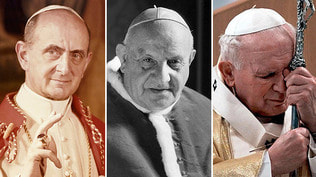

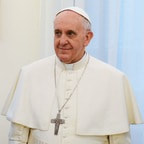
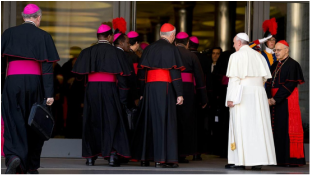

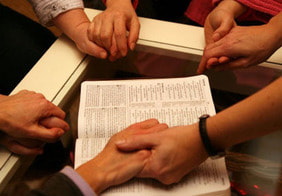


 RSS Feed
RSS Feed